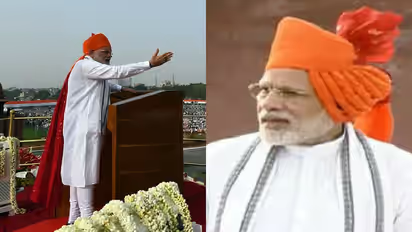
'Everything for all!' That was the crux of Prime Minister Narendra Modi’s Independence Day speech on Wednesday as India turned 71. The last I-Day speech before the next general election slated for 2019 was addressed to the citizenry that is also the Prime Minister’s constituency.
While the prime minister touched upon most of the current topics of relevance to the nation — from triple talaq to the role of the Army and scientific research that would culminate in a manned space mission in 2022 — Modi’s speech indicated what the 2019 general election would be fought around.
The glorification of Northeast India, so far considered a fringe of the nation and on the fringe of development, along with Tamil Nadu, underlined what the PM has on his mind when he will seek a second term next year.
Also read: Independence Day: PM Modi says at 2013 pace of functioning, nation won't have developed for generations
The BJP is alive to the possibility that it might come up some seats short in the north Indian States such as Uttar Pradesh, which it had swept last time in 2014. The party had, therefore, politically cultivated the 'Seven Sisters' of Northeast and started consolidation in the southern States, both under what came to be called ‘Project Coromandel’.
His recitation of Subramanya Bharathi’s poem and the prevailing political churn in Tamil Nadu, in the wake of the deaths of M Karunanidhi and J Jayalalithaa, that have destabilised both the DMK and AIADMK must be considered letters of the PM’s intent.
The BJP has taken the Northeast by storm to the utter dismay of the Congress and Left that had dominated the hilly terrains for the most part of post-Independence India. As things stand today, all the seven States — Tripura, Sikkim, Nagaland, Assam, Arunachal Pradesh, Manipur, and Meghalaya — have either a BJP chief minister or one in alliance with the BJP.
If BJP president Amit Shah’s calculations are anything to go by, the party is eyeing to corner 21 out of the 25 Lok Sabha seats in North East.
The Modi government was the first to create a separate ministry to oversee and ensure the development of the hitherto neglected and, therefore, backward, region by the name of Ministry of Development of North Eastern Region (DONER).
Meanwhile, Prime Minister Modi also addressed the people of Kashmir. While an aggressive policy of blood and iron has been adopted against terrorists, and their compradors among the local population, the Prime Minister assured the peace-loving sections that the policy of his government was based on ex-PM Atal Bihari Vajpayee’s moderate doctrine.
It is coincidental that a nascent civil society in the Valley is progressively coming up from under the veil of fear proffered by the separatists and is voicing its opposition to Pak-sponsored terror. These voices resonate more with the BJP’s narrative than with either Mehbooba Mufti or the Abdullahs.
The declaration of a moderate approach towards Kashmir also coincides with reports of an upending development in the Valley: the BJP might form the next government in the state.
The prime minister touched upon all the political sections of the citizenry. He assuaged the sentiments of the middle class when he gave them the moral credit of ensuring food for the poor as they paid taxes.
The prime minister touched upon issues concerning women, especially Muslim women over triple talaq and once more put the Congress on the mat for blocking the triple talaq legislation in Rajya Sabha; he condemned mob lynching though purely from a law and order angle; lauded the nation’s scientists; placated the backwards castes, among other things.
Last but not the least, Prime Minister Modi used the symbol of an elephant for India, and not the lion. Perhaps, to assure the people that his government is a benevolent mammoth, a juggernaut which is not combative or aggressive.